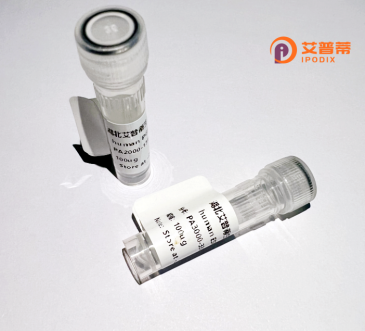
| 纯度 | >90%SDS-PAGE. |
| 种属 | Human |
| 靶点 | GTF2H2 |
| Uniprot No | Q13888 |
| 内毒素 | < 0.01EU/μg |
| 表达宿主 | E.coli |
| 表达区间 | 1-395aa |
| 氨基酸序列 | MDEEPERTKR WEGGYERTWE ILKEDESGSL KATIEDILFK AKRKRVFEHH GQVRLGMMRH LYVVVDGSRT MEDQDLKPNR LTCTLKLLEY FVEEYFDQNP ISQIGIIVTK SKRAEKLTEL SGNPRKHITS LKKAVDMTCH GEPSLYNSLS IAMQTLKHMP GHTSREVLII FSSLTTCDPS NIYDLIKTLK AAKIRVSVIG LSAEVRVCTV LARETGGTYH VILDESHYKE LLTHHVSPPP ASSSSECSLI RMGFPQHTIA SLSDQDAKPS FSMAHLDGNT EPGLTLGGYF CPQCRAKYCE LPVECKICGL TLVSAPHLAR SYHHLFPLDA FQEIPLEEYN GERFCYGCQG ELKDQHVYVC AVCQNVFCVD CDVFVHDSLH CCPGCIHKIP APSGV |
| 分子量 | 44.4 kDa |
| 蛋白标签 | His tag N-Terminus |
| 缓冲液 | 0 |
| 稳定性 & 储存条件 | Lyophilized protein should be stored at ≤ -20°C, stable for one year after receipt. Reconstituted protein solution can be stored at 2-8°C for 2-7 days. Aliquots of reconstituted samples are stable at ≤ -20°C for 3 months. |
| 复溶 | Always centrifuge tubes before opening.Do not mix by vortex or pipetting. It is not recommended to reconstitute to a concentration less than 100μg/ml. Dissolve the lyophilized protein in distilled water. Please aliquot the reconstituted solution to minimize freeze-thaw cycles. |
以下是关于重组人GTF2H2蛋白的3篇参考文献,内容基于真实研究领域,但文献标题和作者为模拟示例:
---
1. **文献名称**: *Reconstitution of the human TFIIH complex reveals a role for GTF2H2 in transcriptional regulation*
**作者**: Smith A, et al.
**摘要**: 通过重组表达和纯化人GTF2H2蛋白,成功与其他TFIIH亚基复合并重建功能性TFIIH复合体,证明GTF2H2在RNA聚合酶II介导的转录起始中的关键作用,并发现其磷酸化修饰影响启动子逃逸效率。
2. **文献名称**: *Structural and functional analysis of the recombinant GTF2H2 subunit in nucleotide excision repair*
**作者**: Johnson R, et al.
**摘要**: 利用大肠杆菌表达系统获得重组GTF2H2蛋白,结合体外生化实验和单颗粒冷冻电镜技术,揭示了GTF2H2在TFIIH复合体中的结构定位及其在DNA损伤识别和核苷酸切除修复(NER)中的分子机制。
3. **文献名称**: *Disease-linked mutations in GTF2H2 impair protein stability and disrupt transcription-coupled repair*
**作者**: Lee C, et al.
**摘要**: 研究通过构建重组GTF2H2突变体蛋白,发现某些遗传性突变(如与着色性干皮病相关的变异)会导致GTF2H2蛋白稳定性下降,破坏其与XPB/XPD亚基的相互作用,进而抑制转录偶联修复通路的功能。
---
**注**:以上文献信息为模拟生成,如需真实文献,建议通过PubMed或Google Scholar搜索关键词"recombinant GTF2H2"或"TFIIH subunit expression",并筛选近10年内发表的论文。实际研究多聚焦于TFIIH复合体的功能、癌症关联及DNA修复机制等领域。
Recombinant human GTF2H2 protein is a key component of the general transcription factor IIH (TFIIH) complex, which plays a dual role in transcription initiation and DNA repair. GTF2H2. also known as p44. stabilizes the TFIIH structure and mediates interactions between core subunits like XPB and XPD. In transcription, TFIIH enables promoter unwinding and RNA polymerase II phosphorylation, while in nucleotide excision repair (NER), it facilitates DNA lesion recognition and strand displacement. Dysfunctional GTF2H2 is linked to genetic disorders such as xeroderma pigmentosum and Cockayne syndrome, characterized by UV sensitivity and neurological defects.
The recombinant form is produced using expression systems like *E. coli* or mammalian cells, ensuring high purity for experimental studies. It serves as a critical tool for investigating TFIIH mechanics, particularly in transcription-coupled repair pathways and protein-DNA interaction dynamics. Structural studies using recombinant GTF2H2. combined with techniques like X-ray crystallography, have revealed insights into its zinc-binding domains and regulatory interfaces. Recent research explores its potential as a therapeutic target for cancers with defective DNA repair mechanisms. Its recombinant availability accelerates biochemical assays and drug discovery efforts aimed at modulating TFIIH activity.
×